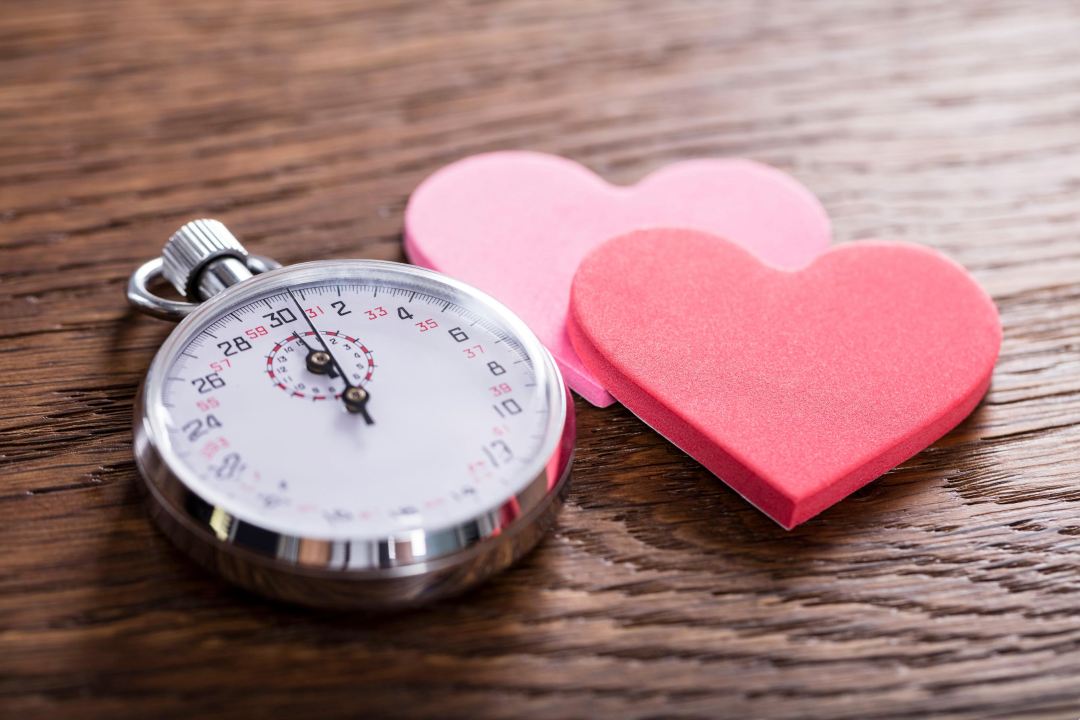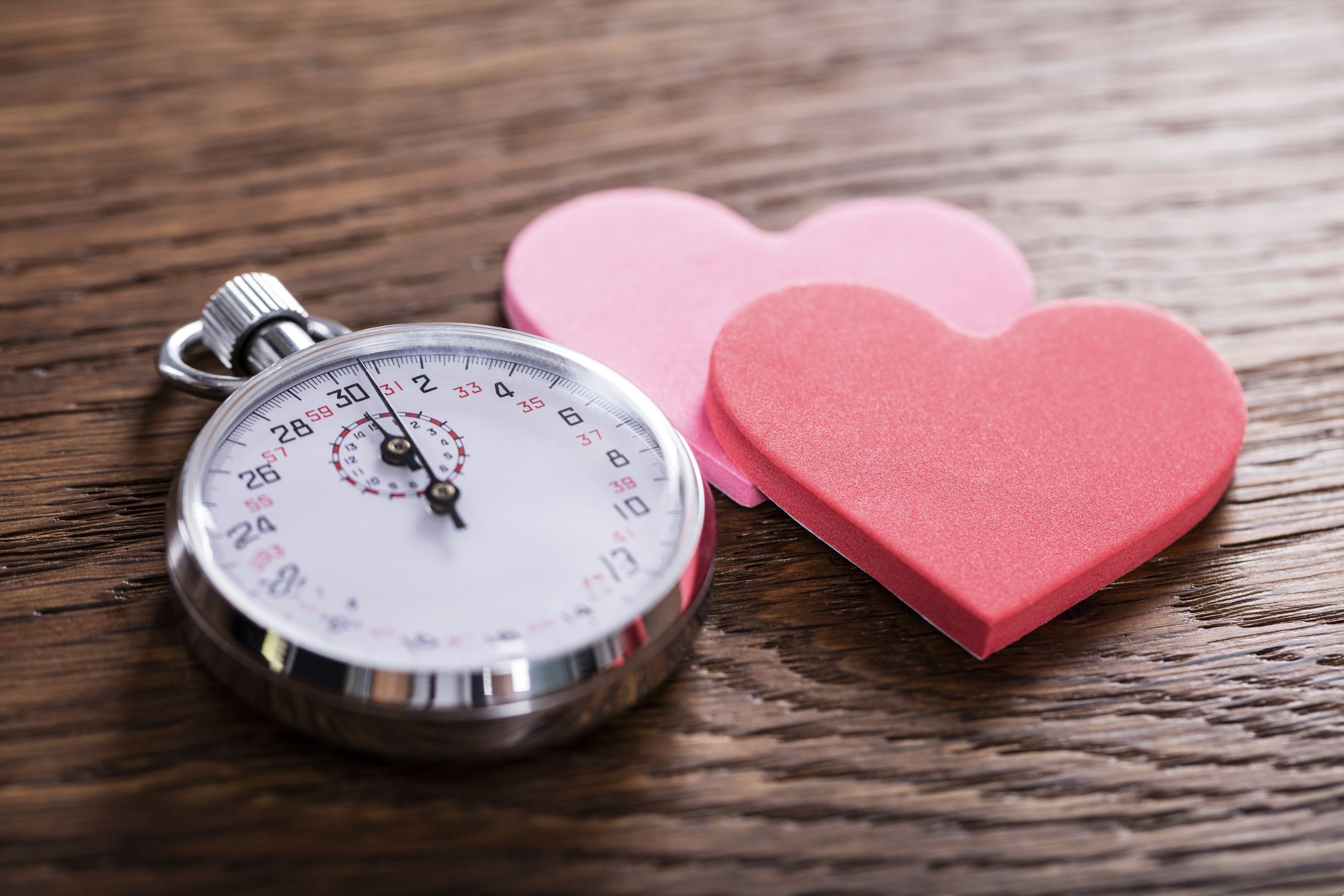New experiences are always good. Meeting new people is always good. This is what I tell myself when my friend Rae invites me to go speed dating. At the age of 42.
‘Am I not too old?’ I ask her. She reassures me that I am not, but I have my doubts. A woman old enough to remember landlines is surely not who the eligible young gentlemen of Kent are looking to meet on a night out in a bar. But Rae is running the event as a fundraiser, so if I spend my night talking to a series of youngsters who think Miley Cyrus was the first to sing ‘Like A Prayer’, it’s all in a good cause.
On the train there, I suddenly realise that this isn’t actually the worst thing that could happen. I might bump into someone I know. And then, with renewed horror, I realise that this still isn’t the worst thing that could happen. I might bump into someone I know and have had a crush on. Or who has had a crush on me. Or who has asked me out. Or who I have been out with. Admittedly such men are few and far between – I generally prefer a nice cup of tea – but the unlikelihood does not in any way temper the indescribable horrendousness of this possibility.
As I open the door to the venue, the row of men seated at the bar all turn, almost in unison, and look at me. Clearly, I am not from round these parts. Any dating situation makes me uncomfortable – I have never tried internet dating – and by the time Rae has gathered us together to explain the rules I am feeling nervous. All the other women are dressed to the nines and – yes – younger than me. I am wearing trainers and concerned that I may somehow have got my lipstick on my forehead.
The way the night works is that the girls remain seated; it is the boys who move from table to table, talking to each of us for just four minutes before our time is up and they move on to the next person. This, I discover, gives the women a subtle psychological advantage; the men are coming to us. It also means they cannot see that I am wearing trainers.
All the other women are dressed to the nines and – yes – younger than me. I am wearing trainers and concerned that I may somehow have got my lipstick on my forehead
I am not concerned about keeping the conversation going – as a journalist it’s my job to get people to talk to me – but Rae has provided ice-breaker questions on each table. These range from the deep and meaningful – ‘You can go back in time to tell one person one thing: who and what?’ – to the rather more abstract – ‘If you could swap legs with an animal, which one would you choose?’ I still have not come up with an answer to this.
The first man at my table is a charming Greek called Yannis. His rolling accent reminds me of my friend George and he is easy to chat to as he tells me about settling in England. But four minutes is not long, even to talk to a stranger, and I am mid-sentence when the bell rings for the boys to change tables.
One after another they come, a procession of hopefuls keen to make the most of their 240 seconds – or sometimes not. One spends most of the time telling me about a dispute with his manager at work; another opens with: ‘Hi, I’m Joel. I’m 32. I don’t really know what else to say.’ At least he’s honest.
I am far from confident, so it is with surprise that I realise that being older has given me one huge advantage: I am not at all worried about how I am coming across. I think back to what I was like when I was younger, how anxious I would have been: was I dull? Was I odd? Did I look unattractive? Now, although I am curious about what impression I give, I am secure enough in myself not to think it matters, or that if we don’t connect it must be my fault. It is only really since turning 40 that I have revisited painful memories of social events from my twenties and realised that I was not as awkward and dull as I was sometimes made to feel. Every conversation, after all, has two people in it.
Once you stop worrying about yourself, you begin to observe others more keenly, and I am fascinated by how the different people in front of me approach the challenge of talking to a woman they don’t know. Some are shy, but make an effort to engage; one or two seem never to have held a conversation of any sort before; some evidently think they are more interesting than they are. Before the event, I would have said that four minutes was nowhere near enough time to form a sensible impression of someone. But in fact I am surprised by how much one can tell even in that short time, if one is watching. As the merry-go-round proceeds, I realise I am having great fun, fascinated by this unexpected sociological experiment.
The last man to sit down at my table before the interval is about my age, and good-looking in a rough-hewn sort of way. He introduces himself as Dave, but he is also a friend of Rae’s and she has let slip that this is his middle name and that his real name is something rather ridiculous. ‘Is that your real name?’ I ask immediately, and a twinkle appears in his eye. Suddenly at ease, I find myself giggling and questioning him about it (‘Why did your parents call you that? Do your siblings have normal names?’) without worrying whether it is bad manners. And he doesn’t seem to mind.
I find out about him – he is a labourer, has two children and doesn’t believe in getting stressed: ‘It’s no good for you’ – but he also finds out about me. I am genuinely curious about others and will push conversations away from myself, but I always notice who is only too glad to have the opportunity to talk about themselves, and who pushes back. Dave is in the latter group, asking proper questions about my career and forcing me to reflect.
His eyes look straight into mine as I talk, and I can tell that all his attention is on me, that he is really listening. Suddenly, I realise how little many of the people I have met that evening have been interested in the person in front of them, given me their full attention or asked questions with real curiosity. Again, when I was younger, I would have detected their boredom and blamed myself for not being interesting enough. Now I realise that it isn’t about me; that as far as they are concerned, I could be anyone, because they are not really talking to me but to themselves.
The interval bell rings, but Dave stays where he is. We do some of the ice-breaker questions, not because we do not know what to say but because they seem fun. When he asks me what I would go back in time to say, I tell him that I would go back to my younger self, and tell her that she was never, ever the problem.
Dave and I both know that we are not going to see each other again; both of us came for fun rather than to look for romance, and we have nothing in common – at least on paper. But we like each other – and there is that spark, that indefinable, unknowable something which fizzles when two personalities connect. It can be romantic, or platonic, or purely physical; and people think that they can search it out, that if they swipe right on enough online profiles it will strike a flame. And maybe they can find it. But maybe it comes to find you, even if it just flickers, for four minutes and then a little more, in an ordinary bar in an ordinary town on a Thursday night. Maybe it touches you and then leaves, but not before reminding you of the beautiful unexpectedness of life, the potential in any encounter.
And then, after the interval, it happens. A round face that seems to smile all the time, so that you can’t help smiling too. He sits down, and I know what is coming.
‘I’m Jamie,’ he grins. ‘Nice to meet you, Sarah.’ I ask him how old he is, and he tells me he is 21. I start to laugh, my head in my hands. ‘I’m twice your age,’ I say. ‘I’m old enough to be your mother!’
‘Well, if you were,’ he says, ‘I would be very proud of you.’
And I think that it was worth coming for that alone – and to be taught that most important lesson of all, by both Jamie and Dave: that no one cares what you tell them about yourself, they only care how you made them feel.







Comments